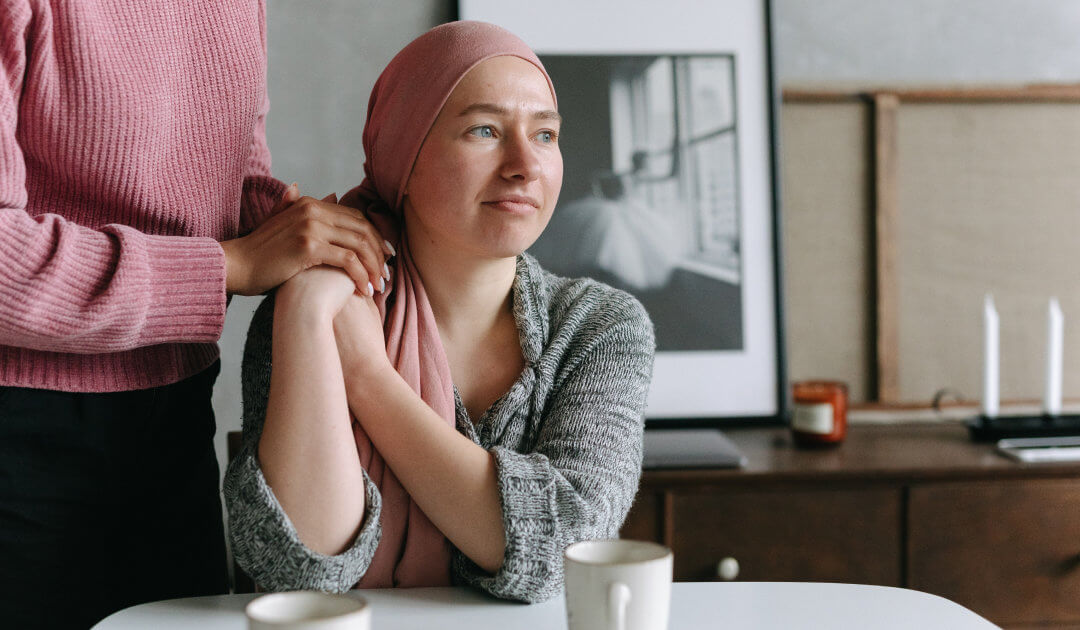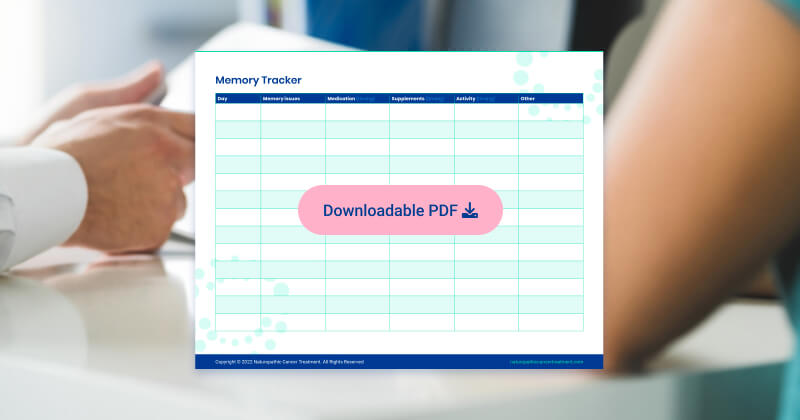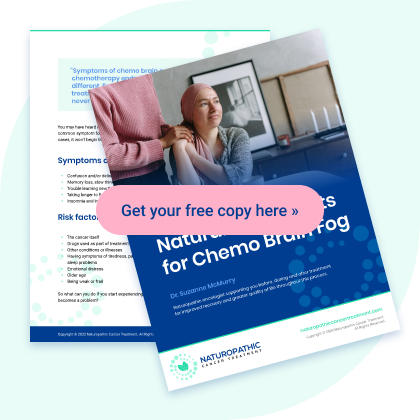“Symptoms of chemo brain can fade after chemotherapy ends, but each patient is different. Some may take a year or more after treatment to feel normal again; others may never regain full mental ability.” – source: mdanderson.org
You may have heard it called chemo brain, chemo fog or chemo brain fog. Chemo brain is a common symptom following cancer treatment. It can happen during treatment. And in some cases, it won’t begin till after treatment ends, as a delayed side-effect from treatment.
Symptoms of Chemo Brain Fog can include:
- Confusion and/or delirium
- Memory loss, slow thinking, difficulty concentrating or staying alert or multitasking
- Trouble learning new things, or forgetting how to do tasks
- Taking longer to finish tasks, feeling disorganized or slower thinking and processing
- Insomnia and interrupted sleep
Risk factors for Chemo Brain include:
- The cancer itself
- Drugs used as part of treatment
- Other conditions or illnesses
- Having symptoms of tiredness, pain, or sleep problems
- Emotional distress
- Older age
- Being weak or frail
- Surgery and drugs used during surgery
- Infection
- Hormone changes or treatments
- Postmenopausal
- Nutritional deficiencies
- Alcohol or other recreational drug
- So what can you do if you start experiencing it, or want to be proactive about it before it becomes a problem?
Lifestyle modifications for Chemo Brain
The first place to start is with lifestyle-based approaches, which can do a lot to help, with little to no cost.
1.) Cognitive rehab:
These are activities to improve brain function that you can do as part of your day. Here’s some examples of what you can do to do some cognitive rehab on a regular basis:
- Use a detailed daily planner, notebooks, reminder notes, or your smartphone.
- Do the most demanding tasks when your energy is highest.
- Exercise your brain. Take a class, do word puzzles, or learn a new language.
- Set up and follow routines. Try to keep the same daily schedule.
- Pick a certain place for commonly lost objects (like keys) and put them there each time.
- Try not to multitask. Focus on one thing at a time.
2.) Exercise
Exercise improves your thinking and ability to focus and increases blood flow to the brain. It may be tough some days, but it’s one of the best things to boost your brain, even if it’s just whatever movement you can manage for the day. It all helps.
The goal with exercise should be 30 minutes of movement at least 5 days per week to get those endorphins going!
If you’re able to incorporate weight bearing exercises this can further help with mobility, bone health and strength. Weight bearing exercises should be done at least 2 days per week to build optimal muscle strength. Look for classes on youtube, your local YMCA or apps such as Peloton or Fitbit.
Even something as simple as a walk around the neighborhood or a local path in the park (Bonus: You also get into nature which can help your state of mind as well).
Or try joining a class, which will also help get out and around people which helps keep your mind engaged.
3.) Meditation:
Meditation can help to improve brain function by increasing focus and awareness, and works best when done consistently.
Don’t worry about sitting for an hour on the floor to count as meditation. Short sessions done on a consistent basis is more important than how long you do each session for. Even 5 minutes daily can help, and can be done just as effectively sitting in a chair.
And there are lots of good apps to help. Try something like the Headspace meditation app, which has plenty of short, guided meditations to get you started quickly and easily. Or choose to start the Basics course, or follow their daily meditations. Find what works best for you.
See the resources at the bottom of this article for more helpful links.
4.) Balance mood disturbances:
In this category, my first step would be to focus on stress management. Stress can cause irritability, anxiety and/or agitation. It can arise due to the difficulty in remembering everyday tasks, reduced short term memory, reduced mental endurance, all common side effects cancer treatment patients may be experiencing.
My pro tip: Try doing your most demanding tasks during the time of day when you have the most energy. By being smart about when you do these tasks, you can leverage your natural energy cycle. This can be different for different people, so just pay attention to when you find you have the highest and lowest energy. Then prioritize more demanding tasks for those higher energy times.
Make a list of your tasks, prioritize those tasks to a manageable list to execute. Three tasks maximum. Making a list can help with remembering as well as build confidence in being able to complete those tasks that you need to do.
And for those lower energy times, just know that right now you’re in a period where you need to go easy on yourself. It’s not forever. So give yourself a little space for the time being.
5.) Get enough rest and sleep:
Good quality sleep goes a long way to helping your brain replenish itself and work at peak efficiency. So make sure you’re giving it the rest it needs. Especially when in a time of high stress or other demands on your body.
Long-term health depends on the cellular regeneration that occurs during deep sleep. Growth hormone, also known as the “anti-aging” hormone is secreted during sleep, which stimulates tissue regeneration, liver cleansing, muscle building, breakdown of fat stores and balances blood sugar.
During sleep free radicals are scavenged in the brain, minimizing its aging, and reducing inflammation. Sleep gives us renewed vitality, a more positive outlook on life and energy with which we can reach our full potential.
Ideally you should get in 7-8 hours of sleep per night, limit naps during the day to have a more restful sleep at night.
Sleep is a time when your brain and body are processing and rejuvenating. Now’s the time to really give that time to repair and renew your priority. So embrace it.
6.) Diet
Food can be very powerful for your whole body, and your brain is no exception. Here’s some great tips to help out your brain during Chemo Brain:
- The MIND Diet: a combination of the DASH diet + Mediterranean Diet
- More information can be found at: https://www.mayoclinic.org/healthy-lifestyle/nutrition-and-healthy-eating/in-depth/improve-brain-health-with-the-mind-diet/art-20454746
- Eat veggies. At least 5 servings daily. Studies have shown that eating more vegetables is linked to keeping brain power as people age.
- Oily Fish have high levels of omega-3 fatty acids (DHA and EPA) and are one the best foods for brain power! Fish to include are salmon, mackerel and sardines.
- Foods high in vitamin A: orange, red and yellow fruits and veggies
- Foods high in vitamin D: fortified foods, cereal, juice, milk, salmon
- Foods high in B vitamins: beans, legumes, red meat, spinach, green leafy veg.
- Turmeric: a brain superfood, it helps to turn on the parts of the DNA that helps to reduce inflammation.
- Eggs: rich in choline, the precursor to acetylcholine, works as one of the main neurotransmitters for supporting healthy mental status. (refer to handout)
7.) Ask for help when you need it:
It should go without saying, but so often we don’t feel like we should or can reach out for help when we most need it.
But this is the single most impactful thing you can do. So you can get the support you need, both as expert guidance and as someone in your corner through this.
8.) Track your memory problems:
I always recommend keeping a diary of what you’re experiencing. This record will be useful when you talk with your doctor about these problems.
An important tool can be to track your memory problems. I always recommend keeping a diary of what you are experiencing. List medications, supplements, activities, sleep and energy on the chart.
This record will be useful when you talk with your doctor about these problems and enable them to draw potential correlations between. And remember the tips above about doing the most demanding tasks when you have the most energy.
Here’s a free printable tracker sheet »
Detoxification programs for Chemo Brain:
Detoxification programs can help with toxin elimination following conventional treatment. This can help to reduce fatigue, enhance brain function, and prevent muscle aches.
Examples of detoxification programs that are helpful with Chemo Brain Fog include:
- Sauna treatments
- Epsom salt baths
- Deep breathing exercises
- Topical castor oil packs
- Lymphatic massage
- Dry Skin Brushing
Download the Companion PDF Summary
We created a printable PDF quick guide to what we went over in this article. Get your free copy here »
How to Get Help
If chemo brain is affecting you, talk with your oncologist, cancer care team and your naturopathic doctor to find ways to help. There are solutions, it’s just a matter of letting your medical team know and going from there.
I’m Dr. Suzanne McMurry, naturopathic oncologist, and can help as an integrative partner in your cancer care team. I help with exactly these kinds of quality of life issues. And also support you before, during, and after treatment with naturopathic solutions to help you get better, faster.
Reach out to me to see how I can help.
Helpful references:
- Book: “The Brain that Changes Itself” by Norman Doidge, MD. This book focuses on the central theme of recovery of neurological functions once lost through various causes, not just chemotherapy.
- Headspace App: meditation https://www.headspace.com/headspace-meditation-app
- Tapping Solutions App: meditation https://www.thetappingsolutionapp.com/
- 10% Happier Podcast: Ben Harris https://www.tenpercent.com/podcast/
- Insight meditation: Sharon Salzberg https://www.sharonsalzberg.com/insight-meditation/




